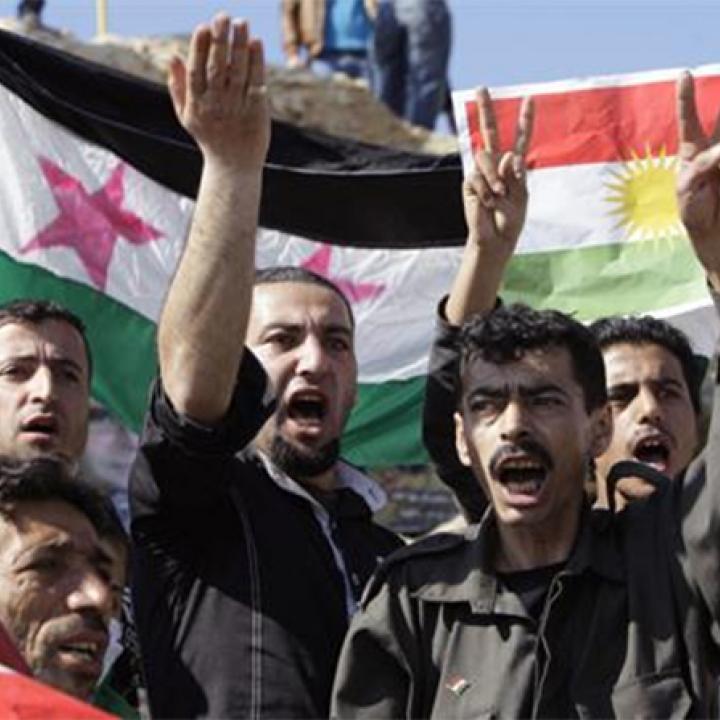
- Policy Analysis
- Fikra Forum
The Advantages of Kurdish Autonomy in Syria

February 21, 2018
Despite the current tactical moves by the Assad regime’s remaining forces to “protect” the Kurds in Syria’s northwestern Afrin province, the regime continues to threaten Syrian Kurds and hint at a restoration of the status quo: a reversal of the federation and self-administration of their areas and those regained from Islamic State (IS). Turkey also rejects the establishment of a Kurdish state on its border, where it recently launched a military campaign that bombarded the city of Afrin, controlled by the Kurdish People’s Protection Units (YPG). This military operation has the potential to open a new front in the ongoing war in Syria and cause Ankara to confront the U.S.-backed Kurds. These threats by Turkey have come in the wake of Turkish speculation that the alliance between the United States and the Syrian Democratic Forces is a temporary alliance that will come to an end with the defeat of IS, and that the United States will abandon the Kurds, prioritizing its relationship with Turkey, its firm NATO ally.
Some mistakenly believe that the United States may abandon its support of the Syrian Kurds as it did when the Iraqi Kurds refused to delay their referendum. In reality, the United States did not abandon the Iraqi Kurds, but rather took a clear stance that the Kurdish leadership did not understand; the U.S. saw that the time was not ripe to conduct the referendum and that it would serve the interests of extremists and of Iran. It also understood that the Kurdistan Region was still lacking the elements of an independent state.
But the reality on the ground in Syria does not reflect that perspective if we look at U.S. declarations and its response to the threats by the Syrian regime. The United States remains steadfast in protecting its Kurdish ally and collaborating closely with it after the successful defeat of IS. The same can be said of U.S. protection for the larger, mainly Arab areas controlled by the Kurdish-led Syrian Democratic Forces: Raqqa and the areas east of the Euphrates River joined to the Democratic Federation of Northern Syria – Rojava. The determination of the U.S. administration is to remain there, build local security forces to protect the area by providing military and diplomatic support, develop local city councils after overseeing their election, and prepare for parliamentary elections in cooperation with the local Arab and Christian communities.
Beyond this existing U.S. policy, the U.S. could contribute to establishing a federal system throughout Syria, including Kurdish autonomy similar to that of the Iraqi Kurdistan Region, in north and northeast Syria. This would not only serve the interests of the United States and the Kurds, but also the interests of the other Iraqi communities (such as the Alawites, Druze, and Christians), who would enjoy autonomous rule to guarantee that the dictatorship of central state authority does not return. In addition, an economically robust Kurdish region will provide U.S. new investment opportunities in oil, gas and water, and energy and agricultural resources.The region is rich with oil and gas fields in the areas east of the Euphrates River to Rmelan.
Militarily speaking, northern Syria is of major strategic importance for Washington; considering that the post-IS stage will present challenges requiring continued military support. These challenges include the return of displaced persons, remaining IS pockets, and the aspirations of the Syrian and Iranian regimes to seize control of Kurdish areas. The existence of a robust Kurdish entity would contribute towards strengthening U.S. military and strategic presence, forming a strong local army capable of protecting the regional federation, contending with the Assad regime in the future and promoting core U.S. interests within Syria, with deterrent power against al-Qaeda, IS and other terrorist organizations. This region would constitute a buffer against the expansion of the Iranian program. Tehran wanted to take control of the Syrian border to Deir ez-Zor –in order to form a corridor from Iraq through Syrian Kurdistan and towards the Lebanese border. However, the continued control of Kurdish forces over the area, with U.S. support, will shatter Iranian goals and geographically separate Lebanese Hezbollah from Tehran.
Yet, Turkey is doing everything in its power to prevent the establishment of an entity for the Kurds in northern Syria. It continues to challenge U.S. interests in the Middle East, accuses Washington of supporting terrorism, and enters into agreements with U.S. enemies such as Iran and Russia. Thus the U.S. is well aware that a decrease or suspension its support for the Syrian Kurds would strengthen anti-U.S. forces in the Middle East, filling the vacuum that would be left by the United States. That would not be in the interests of Washington, or even Ankara, in the long term. It will, therefore, be necessary for the U.S. to provide the Kurds with a certain extent of economic and military aid for the foreseeable the future.


